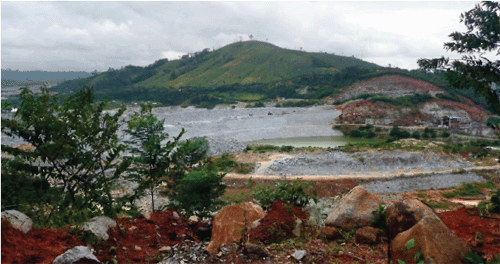Monitoring, understanding and protecting the environment - the Environment Programme (EP)

The Mekong River system faces several environmental challenges over the next decades. Water quality and flows, climate change, hydropower, human infrastructure, fisheries, agriculture and forestry all have an impact on the river environment and in some cases threaten the biodiversity of the Basin's aquatic systems and the livelihoods of those that depend on them. The long-term impact of many of these variables is unknown and much more research and modelling is needed to understand and plan environmental measures.
The Mekong River Commission is working to boost the ability of Member Countries to ensure a healthy environment that can support the area's rich diversity of natural resources while allowing people's livelihoods to flourish. In order to do this, it is necessary to supply essential data and tools for environmental planning and management to the MRC and regional governments. The MRC has expertise at the Secretariat in Vientiane and supports riparian government efforts to monitor water quality and ecosystem health. The MRC helps to improve environmental policy and management through partnerships with various agencies, thereby supporting the Basin Development Plan process.
There are six components within the Environment Programme:
- Programme Management;
- Environmental Monitoring and Assessment;
- Environment Decision Support;
- People and Aquatic Ecosystems;
- Environmental Knowledge; and
- Environmental Flows Management.
Of particular note in 2008 was the formulation of the new MRC Climate Change and Adaptation Initiative, which was launched to support the Member Countries in their future efforts to deal with the impact of climate change. Preparation was made for a major Regional MRC Climate Change Forum, which was scheduled for the beginning of 2009 in Bangkok.

Environmental Monitoring
2008 saw further transfer of the activities of the MRC's Ecological
Health Monitoring System to Member Countries and line agencies
to gradually increase capacity. In the longrun, this will support
a sustainable monitoring system. Routine water quality monitoring
continued and the capacity of national laboratories improved.
The first River Report Card on Water Quality covering 2000-2006
was published in 2008, providing easy-to-read statistics on
the ecological and social health impact of the Mekong.
Environmental Decision Support
A final list of six "trans-boundary critical areas and
issues" was agreed upon by the Member Countries, for the
MRC to prioritise actions over the next decades. These include;
- The environmental and fishery impact of upstream and downstream development;
- Water quality, water fluctuations and fisheries in the Se San, Sre Pok and Se Kong sub-basin;
- Strung Treng (Cambodia) and Champassak (Lao PDR) environmental, tourism and wetland management issues;
- Water quality on the border between China and Lao PDR at Hua Khong;
- The impact of mainstream hydropower development on water quantity and quality including sedimentation in the Mekong Delta; and
- Potential oil spills from water transport between China, Chiang Saen (Thailand) and Bokeo Province (Lao PDR).
The Environmental Considerations of Sustainable Hydropower Development project was formulated jointly with the Asian Development Bank and the Worldwide Fund for Nature. The project will develop a sustainability assessment methodology for hydropower projects based on international standards and suited to the Mekong Region.

People and Aquatic Ecosystems
The MRC scheme to map wetlands focused on training and technology
transfer in 2008. A common land cover, land-use classification
system including different classes of wetland was initiated.
A vulnerability assessment and a social impact monitoring system were developed and the first testing surveys took place in 2008. The system will be fully developed and tested in 2009. This will help improve the way that social aspects and the livelihood of people can be incorporated into various impact assessments including the work of the BDP.
Environmental Knowledge
Work on the Second State of the Basin Report started in 2008
in collaboration with the BDP. The report is expected to be
published in 2010.
Environmental Flows Management
Some delays in implementation in this project occurred in 2008
due to the project objective to increase links with BDP scenarios,
so that the analysis of environmental flows can be used to further
build capacity and raise awareness. Work to establish an overview
of the environmental impacts of tourism in the Lower Mekong
Basin and at the regional level is coming to an end with the
finalisation of country and regional reports expected in 2009.
Choose a newsletter: